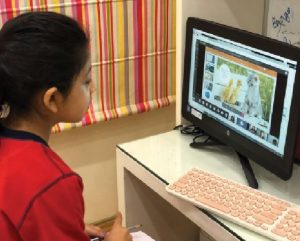 Amid the Covid-19 pandemic, the lives of millions of students have shrunken to their phone screens inside their homes, since online learning becomes the latest wave of education.
Amid the Covid-19 pandemic, the lives of millions of students have shrunken to their phone screens inside their homes, since online learning becomes the latest wave of education.
Educational institutions have been shut since mid-March in India in order to impose social distancing as a precaution amid the Covid-19 crisis. Subsequently, physical classes in schools are paused and the education system is entirely inclined towards online classes. No doubt, online learning helps educational institutions in pushing ahead the academic calendar but this has also raised many concerns among the students, teachers and health experts.
Online classes consist of subject wise 30-45 minutes long sessions of learning where books and other study material are transformed into digital format. Students interact with their teachers and co-students in a conference meeting on various applications like zoom, skype or webinar. Where they virtually assembled at one place and these classes are accessible on smartphones and computers.
In this latest trend of the education system, students are facing numerous challenges as switching from a traditional classroom, with face to face instructor training to computer-based training in a virtual classroom makes an entirely different and difficult learning experience for them. In the absence of well-equipped digital facilities students are struggling to understand the lessons.
According to Tanu Bali, a teacher of DIS Junior School, Delhi, “Moving online for studies has radically affected the present mindset of both teachers and students. But students are facing lots of practical problems, especially less fortunate students who don’t have devices or Internet connections are struggling to get themselves educated until this pandemic ends.”
She also said “Due to the excessive availability of devices for online classes, students spend most of their time on the internet. Children hardly participate in extracurricular activities, whether it may be any sport or music. Hence, they are least physically active these days, which might affect their mental as well as physical health. Also, since they are not able to interact with other students, their communication skills are affected.
Students in big cities and metro cities can avail the internet facilities and can easily access the online classes, but students staying in villages or small towns are still struggling for proper education during this pandemic. Lack of computer knowledge in also becoming a major obstacle for those gullible village students. Teachers in villages are not technically skilled and due to inadequate facilities and resources those teachers are incompetent to provide proper education. So, the concept of distant learning is not properly functional in rural areas and small towns.
As per the report issued by United Nations Educational, Scientific and Cultural Organisation (UNESCO), “Half of the total number of learners — some 826 million (82.6 crore) students — kept out of the classroom by the Covid-19 pandemic, do not have access to a household computer and 43 per cent (706 million or 70.6 crore) have no internet at home, at a time when digitally-based distance learning is used to ensure educational continuity in the vast majority of countries.”
Providing multiple sets of computers in families with more than one child is also challenging. I have one computer at home and classes of both my kids clash at same time due to which they have to scuffle with a lot of technical difficulties during classes, said Himani Ahuja mother of Veer and Shaurya, ASN Public School, Delhi.
 Sharing her experience, Pooja Sharma, mother of Samaira, Student of Cambridge Foundation, Delhi said, “Student are adjusting to the new setup but it’s really difficult to make them sit in front of computers for long hours. Children attending prolonged virtual classes hardly concentrate and get bored very quickly. Technical problems such as internet connectivity and technical difficulties also disrupt their attention span.”
Sharing her experience, Pooja Sharma, mother of Samaira, Student of Cambridge Foundation, Delhi said, “Student are adjusting to the new setup but it’s really difficult to make them sit in front of computers for long hours. Children attending prolonged virtual classes hardly concentrate and get bored very quickly. Technical problems such as internet connectivity and technical difficulties also disrupt their attention span.”
On the other hand, while talking on this issue some parents have mixed reactions and welcomed the new model of the education system. They seem happy with the virtual experience and eager to help their children familiarize themselves with virtual classes.
Parveen Kazmi, grandmother of class V student Abiha Kazmi of Rishabh Public School, Delhi said, “Online classes ensure continuity of learning and help the students to connect with their studies. It is an effective learning platform in the occurrence of prolonged school
closures. For this time, e-learning is the need of the hour.
Problems faced by teachers
During the ongoing pandemic, teachers are facing a unique problems, particularly those who are not technology savvy and the school administration wants them to go through a technical transformation overnight. They are forced to teach without resources and with limited required resources on their smartphones. Without knowing the students’ psychology, behaviour and no physical interaction they grapple to accomplish their duties. It is also difficult for them to conduct online exams and correct the examination sheet of each and every student on mail.
Tanu Bali said. “The biggest challenge for a teacher is to keep an eye on every student during online sessions as it is hard to check every student on a small screen of a phone. Also, it is difficult to avoid their distractions from mobile phones specifically during the session time.
Moreover, teachers are going through pointless intimidations from parents as well as school administration. They face a number of odd parents are watching and judging them for every little movement including their knowledge, grammar, pronunciations, voice modulation etc. Facing a number of technical and privacy issues teachers of many private renowned schools are working on half salary or even without salaries.
Samreen Zehra, teacher, Sunflower Academy, Muzaffarnagar said, “Teachers are working in a great pressure during this time, most of the parents are not technically skilled to operate the system well. Sometimes it took a lot of time to make them understand various assignments on the phone. Our work burden has become doubled, with no time schedule and privacy. Students or parent messages or call us anytime and we have to reply to them in urgency.”
Effects of extensive use of computer and mobiles
Excessive use of mobile phones may cause various health issues like headache, decreased attention, shortness of temper, sleep disorder and depression specially among teenagers. While it also increases cancer risk and influences our nervous system badly.
However, eyestrain from digital classes is a major health concern for students due to spending long hours on the internet. Extreme use of the computer screen can also lead to eye discomfort, fatigue, blurred vision, headaches, dry eyes and other symptoms of eyestrain.
According to Dr. Alkesh Chaudhary, ophthalmologist, MD Eye Care, Delhi, “Attending classes online without a break is said to be triggering problems like dry eye syndrome, burning sensation of eyes and convergence insufficiency. Besides, Prolonged reading on the mobile screen and viewing it closely may result in these types of problems. He also said eye irritation may occur due to poor tear distribution over the eye due to reduced blinking. He advised frequent screen users should blink often or simultaneously as many times as they press the enter button of the computer to prevent eye strain.
As per the reports of United Nations Children’s Fund (UNICEF), “Millions of children are at increased risk of harm as their lives move increasingly online during lockdown in the Covid-19 pandemic”. The statement revealed, increased and unstructured time on the internet may expose children to potentially harmful and violent content as well as greater risk of cyber bullying.”
Taruna Sah
Psychologist, Sanjivani Development Centre, Haridwar
‘Spending more time on digital platforms is risky’
Spending more time on digital platforms encourages the risk of sexual exploitation involving voracious adults building online relationships with gullible children and trapping or pressuring them into sexual activities. A lack of face-to-face contact with friends and partners may encourage wrongful activities like sharing inappropriate images, Taruna Sah, Psychologist, Sanjivani Development Centre, Haridwar, tells Madiha Raza.
Edited Excerpts from an interview •
What are the effects of online classes on students of different age groups and what major changes are observed in their behaviour due to excessive screen time?
For teens
During the teen years, the brain goes through major transformations. This may be why teens are especially vulnerable to the impacts of screen time on brain function and emotional well-being.
◆ Learning: One study found that kids and young adults who spend a lot of time on TV and video games were twice as likely to suffer from attention disorders.
◆ Self-confidence: More time watching videos or other content on digital devices means less time exploring and creating their own experiences, stories, or art.
◆ Social skills: Online experiences can build community and foster communication and creativity. But as Screenagers points out, tweens and teens might hide behind the screen to avoid tricky or awkward conversations, like approaching a crush or making new friends.
◆ Emotions and personality: Studies in young men show that playing violent video games is linked to more aggression and less sensitivity to others. Also, imaging studies have found that internet addiction and game addiction can shrink the brain regions responsible for planning and executive functions, empathy, compassion, and impulse control and games that reward cooperation and support can lower stress, boost mood, and promote helping behaviour.
◆ Sleep: Similar to the findings in adults, screen time can have damaging effects on sleep.
For young children
◆ Learning: Screen time also takes away from unstructured play time, which is important for learning and problem solving.
◆ Language skills: Research has shown that TV can hamper language development in kids by displacing time spent interacting with caregivers. Digital devices might have a similar effect.
◆ Emotional development: Some experts worry that using digital devices as “shut-up” toys to occupy kids during day-to-day tasks like grocery shopping or eating out might prevent them from learning how to regulate boredom, distress, and other impulses and emotions.
◆ Vision: In recent years, many countries are experiencing epidemic levels of myopia, or short-sightedness, and indoor time may be to blame.
◆ Sleep: They saw especially strong links between screen time and delays in bedtime, as well as a shorter period of time spent asleep.
In the absence of a traditional classroom, how difficult for students to manage in a virtual learning environment?
Virtual classes create stress in students. Online learning can be quite stressful for children as it is a change from their normal structure and they are not accustomed to the new way of learning. Stress, parents might start noticing behavioural changes in their children such as excessive arguments, refusals, opposition, defiance, or withdrawal, and it is not unusual for some kids to fall further behind.
How difficult is it for a teacher to understand a child’s behaviour in distance education?
As hard as distance teaching might be, it’s likely even harder for students. They’ve gone from classrooms explicitly designed to support learning, to bedrooms and kitchen tables where distractions are plentiful and expert support isn’t always on hand. It’s no surprise that more than a few will be tempted to opt out.
letters@tehelka.com













